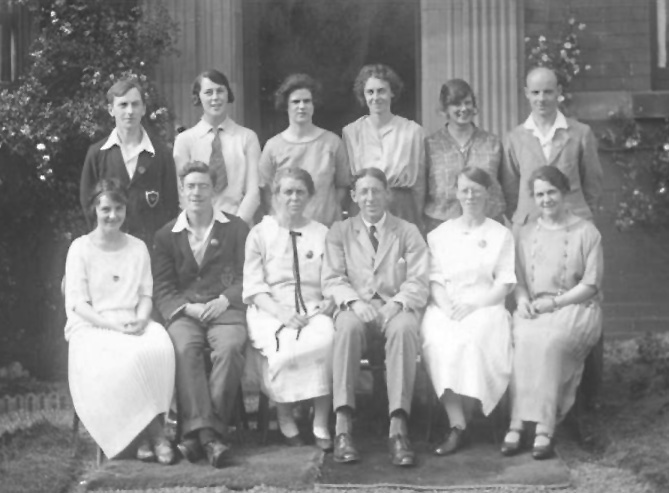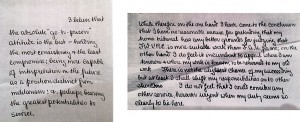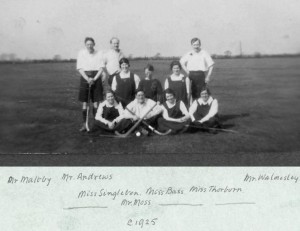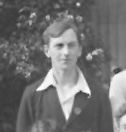
Cyril and Alwyne Walmesley were two young professional Quakers from Lancaster whose lives would change dramatically with the outbreak of war in 1914. Both men shared strong religious beliefs. However, their approach to the war and the way each reconciled their Quaker belief in non-violence with their response to Britain’s involvement in the war differed. Alwyne took an absolutist stance, opting for imprisonment rather than involvement with the Friends Ambulance Unit, an alternative service to which he was conscripted as a religious conscientious objector. Cyril, on the other hand, chose to undertake work with the Friends War Victims Relief Committee, alleviating the suffering of people in war-torn France.
The Walmesley Brothers: Alwyne Arthur Walmesley
Posted by Caroline Morrison, with additional research by Janet Nelson
Alwyne Walmesley was a Lancastrian Quaker, a teacher and a conscientious objector during World War One who was imprisoned twice for his pacifist belief.
According to the 1911 census return, an 18 year old student Alwyne Walmesley lived at 2 Castle Park, Lancaster with his mother Caroline, who was the head of the Friends School, his brother Cyril, an engineering student, and sister Isolene. His father James had died in 1903. Alwyne’s hopes for his future would be affected by the declaration of war against Germany in 1914. After two years of war and tens of thousands of men slaughtered, the British government was running short of volunteers to fight at the Front. A major push was planned for the spring and summer of 1916 to break though the enemy lines. In order to ensure sufficient manpower for this offensive, the Military Service Act introduced conscription on 1st March 1916.
Invoking the ‘Conscience Clause’
At the outbreak of war in 1914, a group of pacifists from socialist and religious backgrounds formed the No Conscription Fellowship (NCF) to protect pacifists from being forced into military service. The NCF had campaigned to have the ‘conscience clause’ added to the Military Service Act, giving conscripts the right to claim exemption from military service on various, including religious, grounds. In practice, however, the composition of the tribunals which heard the cases and the general mood in the locality made it difficult for those individuals who invoked this clause. Alwyne Walmesley was one such individual.
As a Quaker, Alwyne Walmesley believed in non-violence. When conscripted, he would apply for an exemption on religious grounds. From the records found it is possible to partially reconstruct his war-time experience.

Extracts from letters written by Alwyne in May 1917. From the collections of the Religious Society of Friends (Quakers) in Britain, ref: LSF Temp MSS 835 Box 7 – www.quaker.org.uk
It appears that Alwyne was studying or teaching in Cambridge during the war, as in April 1916 he applied to the Cambridge Tribunal for exemption from military service (The Friend, 13th July 1917). He was given a partial exemption, which required him to join the Friends Ambulance Unit (FAU) to help with the injured. He would not be expected to bear arms. However, it seems that Alwyne accepted to join the FAU on the understanding that it was for four months only, after which he resigned on conscientious grounds and appealed to the tribunal in July 1917 to re-open the case. They refused and declined to interfere any further, referring the case back to the recruiting office for military service. Letters written by Alwyne during this period indicate that he strongly believed that he was needed in school and also that he felt he needed to demonstrate a clear, anti-militarist stance.
Alwyne’s Arrest and Sentencing in Lancaster in 1917
The Lancaster Guardian reported that Alwyne was arrested in Lancaster, his hometown, after failing to present himself under the Military Service Act. He was brought before the Lancaster Borough Bench on the 28th June 1917, where he confirmed that he had no certificate of exemption. The paper reports that, while Alwyne was under arrest, the Army officer, Captain Wardle, had given him every opportunity to join the Friends Ambulance Unit but Alwyne refused, saying it was a question of conscience. Alwyne defended himself to the Bench in the following terms:
‘I cannot do military service. The Friends Ambulance Unit is a military service but I offered to do any non-military service at all. I was given only the opportunity of military service’. (Lancaster Guardian, 7th July 1917)
The Bench was a civil authority which found Alwyne guilty of refusing to present himself for military service under the Military Service Act. He was fined 40 shillings and handed over to the military authorities, where he would face a further hearing. A conscientious objector having been refused exemption but still refusing to participate in military service would be court-martialled and sent to prison. Alwyne was condemned to 6 months hard labour and sent to Wormwood Scrubs. He wrote:
‘I am off to Wormwood Scrubs in the morning to do 6 months hard labour. I feel in the best of health and spirits though my one-handedness makes me feel rather awkward’. (The Friend, 31st August 1917)
I have not found any evidence that Alwyne had lost a hand but if that was the case he would not have passed the medical for military service. As an ‘Absolutist’ it is possible he would not submit to a medical examination, as that would be accepting military service. However, in later photographs, taken during his time at Penketh School in the 1920s, he is seen with the sports teams. It may be that the one-handedness was a temporary injury – a broken arm or such like.
I cannot do military service. The Friends’ Ambulance Unit is military service but I offered to do any non-military service at all. I was given only the opportunity of military service.
Alwyne in Prison
Of Alwyne’s time in prison we know very little. He receives a mention in John Graham’s book, Conscription and Conscience – A History 1916-1919, when the author refers to conditions in prison at Christmas 1917. Graham mentions Christmas cards, allowed by prison rules, which were sent round by the Chaplains Committee. Alwyne, who was a teacher at Penketh School when the book was written in 1922, was quoted on how welcome those Christmas cards and the prison chaplains’ visits were to those incarcerated. There is also a reference to singing which took place outside the prison walls but which prisoners could hear and know they were not forgotten.
Alwyne’s Re-Arrest in 1918
Alwyne would have been released from prison in January 1918 but was shortly thereafter arrested again for refusing to do military service. This ‘cat and mouse’ practice was a common occurrence for conscientious objectors. His second sentencing in 1918 was reported in the Lancaster Guardian thus:
‘Mr. Alwyne A. Walmesley B.A. Meadowside Lancaster whose arrest as a conscientious objector was reported last July in the Guardian and who was sentenced to 6 months hard labour for refusing to join a Non-Combatant corps was court-martialled again at Park Hall Camp Oswestry on Thursday. He told the Court that the interval of imprisonment had intensified his Christian faith. The call of Christ rose clearly above the din of their struggling, their passions and interests, and he believed that in the spiritual development of the individual lay the only hope of salvation of Society, the only check to prevent civilisation from plunging headlong into the anarchy to which it is only too clearly advancing. The nation which retained sight of the just relationship of values, which could still distinguish the virtue of real things, was the one which would come out of this awful struggle with her vital, her moral strength least impaired, whatever her material gains or losses may be. They must beware less they did not draw back in time from their apparent inclinations to follow along the disastrous path of political thought that Germany had chosen and which had led to all her perverse aspirations and to the brutal working out of the same. Down beneath the unutterable turmoil and eddying of the world today still lay the currents of eternal truth. Should they follow Germany’s example, and dam them up and become a sordid nation, or should they recognise the dangers that lay ahead of them, break down the half built dams, and let the currents flow once more along over their natural courses and continue in our freedom and greatness? He recognised there were signs in that direction, and wished they permeated those in whom lay the power.’
It was also reported that ‘in September last when before the Central Tribunal at Wormwood Scrubs prison, Walmesley was told “they considered his objections indisputably genuine”, complimented him on the “honourable and straightforward manner in which he had acted throughout”, and said they would not waste time by asking him to take the Home Office scheme’ (Lancaster Guardian, 12th January 1918).
He told the Court that the interval of imprisonment had intensified his Christian faith.
A further sentence of two years’ hard labour was passed by the Oswestry Court Martial. Alwyne was subsequently transferred from Shrewsbury prison to Manchester civil prison (The Friend, 15th March 1918).
Alwyne’s Visits to the Lancaster Meeting House
Alwyne was present at the Lancaster Friends meetings on three occasions, according to the minute books: 12th April 1916; 13th June 1917; 13th August 1919. From this we can deduce the time scale when he was not in prison. Unfortunately, none of the minutes of the Quaker meetings in Lancaster reflect any discussions which might have taken place regarding his conscientious objection to conscription or to his prison terms.
Being a C.O. was not an easy option during the First World War and the term 'coward' which was often used was totally unjustified. It required a great courage and strength of character to withstand the hardships of imprisonment in order to remain true to one’s faith.
Alwyne’s Bravery as a C.O.

Alwyne Walmesley and the Penketh School hockey team – Warrington, 1925 (Image courtesy of Warrington Library)
A notice in The London Gazette states that retired schoolmaster, Alwyne Arthur Walmsley, died on 25th May 1967. Alwyne was one of thousands of young men who suffered greatly, both physically and mentally, in order to remain true to their belief in non-violence and the sanctity of life. Their story has rarely been told, as there was for many years a stigma to being a conscientious objector in the face of the sacrifice of millions of young men from all sides in the war. The treatment of C.O.s in prison was brutal. Both the prison guards and prisoners abused C.O.s in the most cruel ways. Being a C.O. was not an easy option during the First World War and the term ‘coward’ which was often used was totally unjustified. It required a great courage and strength of character to withstand the hardships of imprisonment in order to remain true to one’s faith. Alwyne is just one of a long list of dissenters from Lancaster but his story deserves to be told.
- The Friend: The Quaker Magazine, 13th July 1917 and 31st August 1917. London: The Friend Publications Ltd.
- Graham, John W. 1922, Conscription and Conscience – A History 1916-1919. London: Allen & Unwin.
- Lancaster Monthly Meeting Minute Books, 1916-19. Available at the Lancashire Archives, Preston. Reference FRL2/1/1/23 [insert hyperlink http://archivecat.lancashire.gov.uk/CalmView/Record.aspx?src=CalmView.Catalog&id=FRL%2f2%2f1%2f1%2f23].
- The Gazette, 28th July 1967. London: TSO.
- Lancaster Guardian, 7th July 1917 and 12th January 1918.


